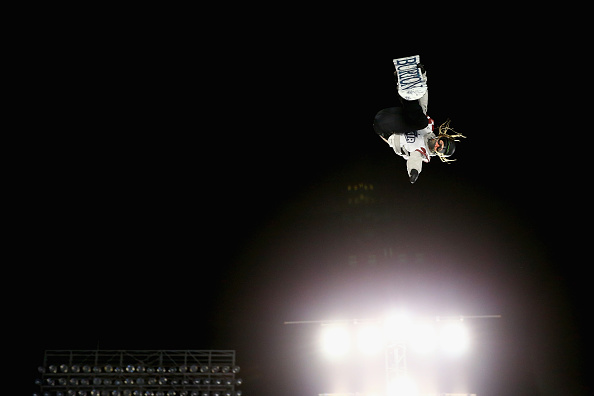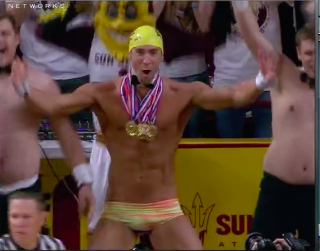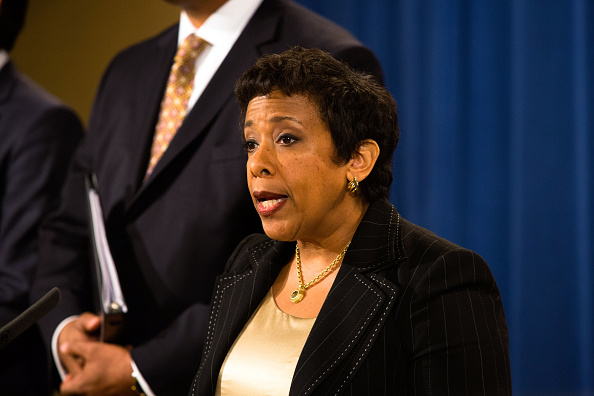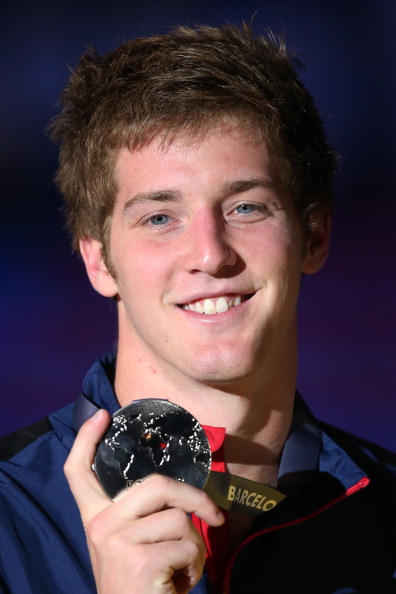-- In advance of the publication in the coming days of highly technical planning details, it’s far-more-interesting logo-unveil time in the 2024 Summer Olympic bid game. Paris, for instance, came out a few days ago with a stylized Eiffel Tower. On Tuesday, Los Angeles unveiled its logo and the tagline, “Follow the sun.” Reaction: let’s be honest here and admit that logos and slogans rarely play a huge role come voting time, with the exception perhaps of the incredibly on-point Pyeongchang 2018 tag, “New Horizons.”
At issue in this 2024 campaign is nothing less the fundamental direction of the Olympic movement: whether the International Olympic Committee is prepared to take LA mayor Eric Garcetti and bid leader Casey Wasserman up on what they said Tuesday to a fired-up crowd on the 30th floor of a downtown skyscraper, the sun setting gloriously to the west. The mayor: “Imagination is critical because it leads to hope. Hope leads to dreams. Dreams lead to innovation. That is the story of our city.” Wasserman said a "sense of relentless reinvention and new beginnings” anchor “LA2024’s distinctive value proposition for the good of the Games and the Olympic movement,” a bid with 97 percent of the venues already in place or planned (canoe slalom still to be figured out).
Let’s be honest some more, because at some point there has to be plain talk about this campaign, and it ought to start now, even though the vote isn’t until 2017 and lots can, and will happen. Right now, Europe — pretty much all of it — is a big question mark. As former U.S. treasury secretary Lawrence Summers wrote in Tuesday’s Washington Post, “These are difficult times in Europe with the refugee crisis, economic weakness, security issues and the rise of populist movements.” There’s LA, and then there’s Paris, Rome and Budapest. This campaign will doubtlessly feature any number of references to Paris mounting a fourth bid. At the same time, it needs to be understood that the LA effort is not just an LA, or SoCal, thing; it is America’s third bid, after New York in 2005 for 2012, Chicago in 2009 for 2016.
Straight talk, continued: logic and common sense say the IOC can hardly run the risk of turning down the three biggest cities in the United States in succession. (Of course, it can do so, and an IOC election can typically prove volatile.) But if LA does not win for 2024, it would be exceptionally problematic — and that is putting it gently — for LA to come back for 2028, or to see any other American city step up. It takes millions of dollars to run a bid, and in the United States that money has to be privately raised. The money is here and now for LA24. Imagine a 2024 loss — and then Wasserman going back to all those he hit up for $1 million apiece and saying, looking at 2028, something like, oh, well, now the IOC is going to treat us fairly. Not going to happen. The time is now.
-- IOC president Thomas Bach was in LA earlier this month, making the rounds after prior visits to Paris, Rome and Budapest, the other cities in the 2024 race. Bach then went up to Silicon Valley for talks.
Reaction: so curious that the far more important purpose of Bach’s California trip, the excursion to Silicon Valley, drew minimal press attention. He met with representatives of Visa, Facebook, Twitter and Google, among others. The IOC needs big-time help in reaching out to young people; it is focused in particular on the launch of the Olympic Channel. If you’re an IOC member, looking at that line-up in California, and there’s a California bid, doesn’t that too comport with logic and common sense?
-- One more LA note. The U.S. Olympic Trials for the marathon went down Saturday on a course that wound around downtown and the University of Southern California campus. Galen Rupp won on the men’s side. Many in the running press (there is such a thing) immediately pointed to the possibility of Rupp, silver medalist in the 10k in London in 2012, running both the 10k and the marathon in Rio.
Reaction: let’s wait to see what the U.S. Anti-Doping Agency has to say in the coming months, if anything, about Rupp and his coach, Alberto Salazar. As Kara Goucher, the women’s fourth-place finisher, said after the race, "Justice is coming."
-- Speaking of the IOC’s purported youth outreach: the Winter Youth Olympic Games in Lillehammer are on.
Reaction: did you notice? Did anyone — like, any teens or 20-somethings? The very best part about the YOG experiment is the Young Reporters program, which has produced a number of promising young stars. There’s also an argument that the Youth Games serve as a petri dish of sorts, allowing the IOC and, perhaps more important, the international sports federations to check out without real peril events such as skateboarding (Nanjing YOG, 2014) and, now in Lillehammer, parkour. Fine. But that’s not the point of YOG, expressed by former IOC president Jacques Rogge in launching it. It’s to connect meaningfully with young people. How’s that going?
-- Speaking of a way that actually works in reaching young people: kudos to organizers, and especially the U.S. Ski and Snowboard Assn., for the Big Air event a few days ago at Boston's Fenway Park. It featured jumps and tricks off a 140-foot ramp set up on the field at the iconic baseball stadium.
Reaction: terrific idea, terrific execution. Great stuff, especially on TV.
-- USA Swimming announces a contract extension, through the end of 2020, for executive director Chuck Wielgus.
Reaction: USA Swimming is one of a handful of well-run national governing bodies, and that is in significant measure due to Wielgus, who is a fundamentally decent human being. Anyone who knows USA Swimming knows Wielgus has wrestled for years now with cancer; he deserves widespread admiration and respect for the soft-spoken courage he has repeatedly shown in public in dealing with significant medical issues. Switching gears: the well-publicized challenges sparked by sexual abuse of young swimmers are not — repeat, not — Chuck Wielgus’ fault. Six years ago, in particular in regard to the comments he made on an ABC 20/20 investigation, was Wielgus at his best when he said he didn’t feel the need to apologize? No. Does an 18-year tenure deserve to be judged by one moment? No. And, now, USA Swimming is way ahead of the curve with its SafeSport program. If you want to criticize Wielgus, he deserves credit, too, for realizing, perhaps belatedly, what was wrong and helping to craft an industry-standard response. What should be Wielgus’ next goal: effecting fundamental change in the USA Swimming governance structure. Simply, the board of directors has too many people; it’s too big and unwieldy. Better for USA Swimming to do what it does best, and be a leader in the field, meaning slim down the board, before something happens — whatever that might be — to compel change under pressure.
-- Michael Phelps shows up in a swim brief and has fun with the Arizona State basketball-game "Curtain of Distraction."
Reaction: you can just tell the guy is happy. Which means: watch out, world. Prediction, absent a huge surprise at the U.S. Trials: five Rio gold medals (200 IM, 200 butterfly, 100 fly, 800 relay, medley relay), and that is no knock on his friend and rival, Ryan Lochte. As long as Lochte continues to pursue the 200 backstroke — at the Olympics, the 200 back final goes down before the 200 IM final on the same night — it’s a lot to ask, particularly of the legs, to go for gold in the 200 IM, too. As for the butterfly events, Chad le Clos of South Africa is a major talent. But in saying last summer after winning the 100 fly at the world championships (Phelps did not swim at the 2015 worlds) that Phelps could “keep quiet now,” le Clos awoke the tiger, and probably foolishly. Phelps has always done best when someone goes and trash talks — ask, in sequence, Ian Thorpe, Ian Crocker and, of course, Milorad Cavic. The x factor for Phelps in Rio: the 400 free relay, one of the signature moments at the Beijing 2008 Games, when Jason Lezak turned in an otherworldly last leg to beat Alain Bernard and the French. For the past couple years, the French have been the world’s best in that event, and it’s not clear, at least yet, that even with Phelps the U.S. has what it takes.
-- The Zika virus takes over the Olympic news cycle, and U.S. soccer women’s national team goalie Hope Solo, among others, expresses concern about being part of it all in Rio.
Prediction: Solo goes to Rio.
-- Two former officials with the Russian anti-doping agency, which goes by the acronym RUSADA, die within two weeks. Founding chairman Vyacheslav Sinev, who left RUSADA in 2010, died Feb. 3. Then this past Sunday, Feb. 14, the former RUSADA executive director Nikita Kamaev, died, just 52, of a “massive heart attack,” the agency said. Kamaev had resigned just two months ago, amid the doping scandal that sparked suspension of the Russian track and field program. That scandal is tied, in part, to a November report from a World Anti-Doping Agency commission that suggested state-sponsored doping. On Feb. 11, three days before Kamaev’s death, the Russian prosecutor-general’s office (predictably) rejected the WADA commission report, saying it held no concrete facts proving state-sponsored doping.
Reaction: it's like a Russian novel, full of twists and turns and who knows what. For that matter: who knows, really, what is believed to be real in Russia, and what is not? This prediction, though: like Hope Solo, the Russian track and field team will be in Rio. The IOC is super-big on a concept called “universality,” which means everyone in the entire world coming together. It’s actually a fundamental rationale for the Games. Given that, how possibly can officials — in particular track and field’s international governing body, the IAAF, or more, the IOC — keep the Russian track and field team away? Also: who really wants to challenge Vladimir Putin, given the potential for many uncertain ramifications?
-- U.S. Supreme Court Justice Antonin Scalia dies over the weekend at a ranch in Texas.
Reaction: what might that have to do with sports? Turn to a case called Crawford vs. Washington, decided in 2004. The 6th Amendment to the U.S. Constitution says that in a criminal case, the defendant “shall enjoy the right … to be confronted with the witnesses against him.” What does that mean when someone makes a “testimonial” statement out-of-court but doesn’t (that is, can’t, for instance because of illness, or won’t, because of the assertion of privilege) testify in court itself? Writing for a unanimous 9-0 court, Scalia said the “testimonial” statement can’t be admitted as evidence — unless the defendant had a prior opportunity to cross-examine the person who made that statement.
So, again: sports? The U.S. Department of Justice inquiry into corruption at FIFA centers on Chuck Blazer, the American who was formerly a high-ranking soccer-world executive. Blazer reportedly has been ill for years with colon cancer. What if he dies before any trial? Would anything he had to say be admissible? For that matter, U.S. Attorney General Loretta Lynch has already been prominently mentioned as a potential Scalia replacement. Would the Justice Department be so interested in aggressively pursuing soccer stuff if someone else took over?

















